2022.10.12
CULTURE“Shunkan,” “Antigone,” “The Cherry Orchard,” Expanding the Circle of Excitement beyond Language Barriers
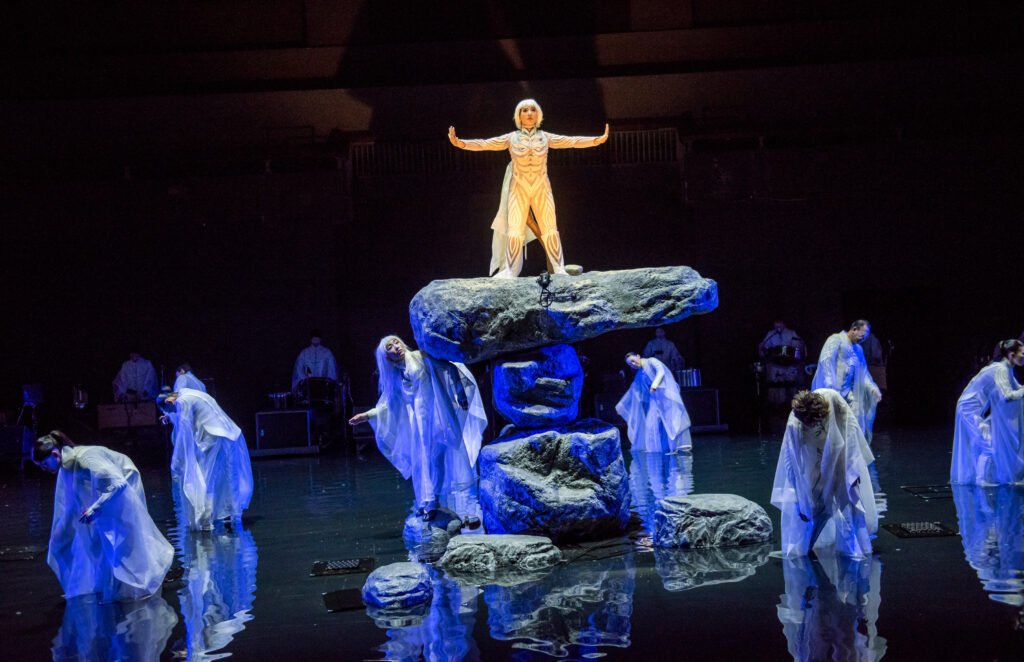
A performance of “Antigone” in New York as an official “Japan 2019” project. Photo: Stephanie Berger
From traditional performing arts to contemporary theater, the Japan Foundation has shared its excitement with overseas audiences through the introduction of Japan’s unique performing arts. It was the tireless efforts and enthusiasm of all involved that led to the realization of these historic performances.
Performing arts, where audiences can see the performances live on stage, are the starting point for cultural exchange, conveying emotions that transcend language to many people. The Japan Foundation (JF) has introduced a wide range of Japanese performing arts to overseas audiences. In 1973, the year after its establishment, JF organized the first Southeast Asian tour by Takarazuka Revue, which was held in three countries, even though the infrastructure was hardly ideal. In 1979, JF presented a Grand Kabuki performance in China to commemorate the Treaty of Peace and Friendship between Japan and the People’s Republic of China. It was received with great enthusiasm by the citizens of Beijing, and is still talked about today. In 1989, a group including taiko drum performer HAYASHI Eitetsu and jazz pianist YAMASHITA Yosuke traveled through six African countries. In 2004, JF helped realize the Broadway revival of musical “Pacific Overtures,” directed by MIYAMOTO Amon, in commemoration of the 150th Anniversary of the U.S.-Japan Relationship. It was a historic event, as it was the first Broadway production by a Japanese director.

In 1979, JF organized the first performance by a Grand Kabuki troupe in China. The 20-vehicle-long cavalcade of performers, comprising some 70 members of the troupe aboard luxury limousines and minibuses, with an accompanying police escort, received a rousing welcome from the citizens of Beijing.
In striving to deliver the best performances by the finest performers, the overseas productions organized by JF have occasionally brought about artistic fusions and innovative staging. A good example is “Shunkan,” a joint performance featuring Noh, Kabuki and Bunraku that took place in four European cities in 1994. This would not have been possible in Japan, but thanks to the conditions of the overseas performance, it became a reality.
Realizing a Project that would be Unthinkable in Japan
The background was the end of the Cold War and the 125th anniversary of the Japan-Austria Treaty of Amity and Commerce. Until then, Eastern European countries had few opportunities to be introduced to Japanese culture. JF’s aspiration to deepen its relationship with these countries matched the timing of the Vienna Art Week’s special feature on Japan, which was held during this commemorative year. Under the title “Three Major Traditional Performing Arts in Europe,” the production started in Vienna, then went on to Warsaw, Prague and London, attracting audiences that cumulatively totaled more than 10,000.
However, there were many obstacles to making this happen. First of all, a collaboration between Noh, Kabuki and Bunraku represented an unprecedented challenge. The artists bearing these traditional performing arts, however, all shared a strong desire to tackle new challenges as modern-day artists. They were able to surmount all obstacles through their enthusiasm and the joint efforts of the production staff and performers, who were determined “to show their best with this rare opportunity” and “courageously push forward.” The powerful backing of classical theater researcher KAWATAKE Toshio as general supervisor and KANZE Hideo as artistic director served to enthuse their efforts. Another significant factor behind its success was that the Japan Arts Council, being in a position to promote the three performing arts, was their leading proponent.
Secondly, the difference in stage structures between Europe and Japan also posed a conundrum for the creation of equipment and staging. At the time, out of the four cities where the show was to be performed, JF only had a base in London. Therefore, a special system was put in place to coordinate everything from travel arrangements to the securing of theaters and the making of stage sets locally and internationally. However, as it turned out, these experiences proved to be a great asset for JF.
“Shunkan” is a human drama with timeless universality including thoughts for one’s hometown, the sadness of separation and feelings for loved ones. This creation, imbued with the overwhelming expressiveness of Noh, Kabuki and Bunraku, clearly conveyed the unique sensibilities and sensitivities of Japanese people to audiences from all over the world. There were at least eight curtain calls each time, all to lasting applause.
Dr. Peter Pantzer, then director of the Institute for Japanese Studies at the University of Bonn, attended the Vienna performance. He wrote in an article for JF’s “International Exchange” magazine about a young man who sat next to him at the theater. He was an electrician who seemed to have come straight from work. He told Dr. Pantzer that he had attended a symposium about Japanese performances and became interested in stories about the artists, and that he longed to know more about Japan. His story left an indelible impression on Dr. Pantzer. He concluded the article with the words, “Shunkan’s suffering has been rewarded.”
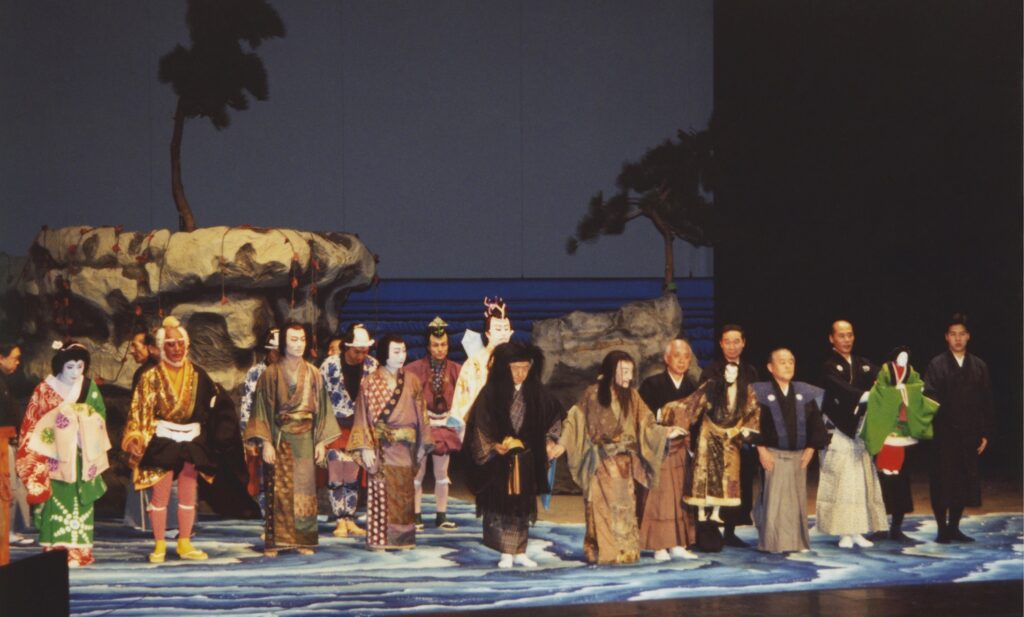
Curtain call at the Vienna performance of “Shunkan.” London’s Daily Telegraph described the moment at the end of the performance when the three Shunkan characters, played by Noh, Kabuki and Bunraku performers, appeared on stage simultaneously, saying, “In this moment, we are not only given the realization that these three classical theatrical forms have very different powers, but we are also given three different insights into the same situation at the same time. It took 600 years to reach this stage, but it was worth the wait.”
A Desire to Create Universal Appeal in Theater
In 2019, a quarter of a century after the excitement of “Shunkan,” the Greek tragedy “Antigone,” produced by the influential director Mr. MIYAGI Satoshi, enthralled New York audiences. The performance was organized by JF as one of the official projects of the Japan Festival “Japan 2019” in the United States, with the Shizuoka Performing Arts Center (SPAC), where Mr. Miyagi is the General Artistic Director.
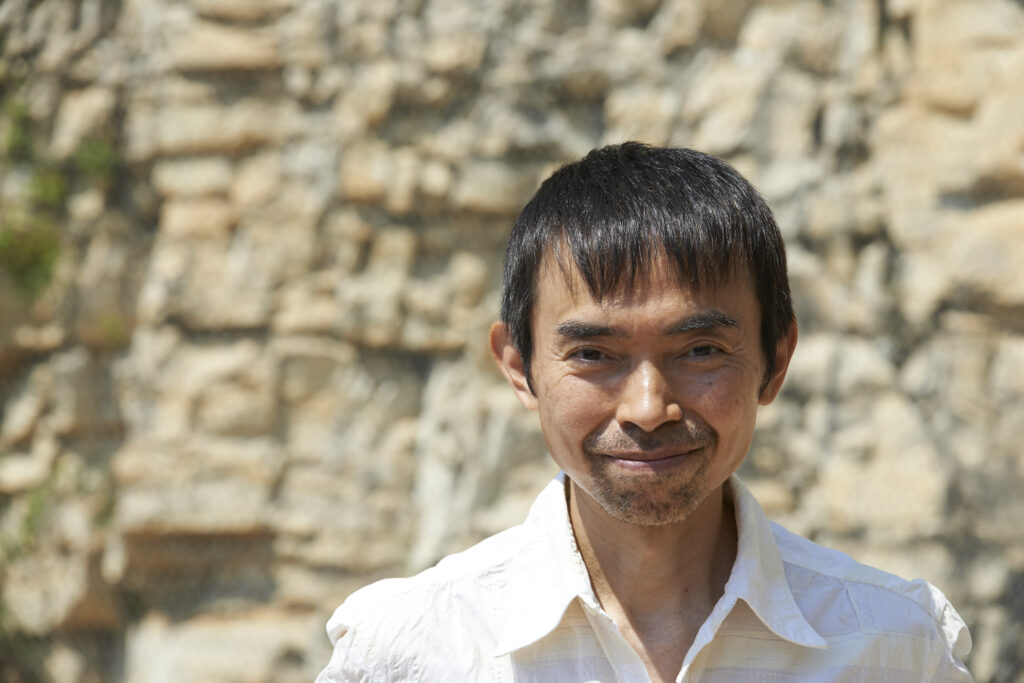
Mr. MIYAGI Satoshi was appointed General Artistic Director of the Shizuoka Performing Arts Center (SPAC) in 2007. “Antigone” was selected to open the 2017 Avignon Festival. Photo: ©Ryota Atarashi
The impetus for this performance came in 2017 when SPAC’s “Antigone,” directed by Mr. Miyagi and supported by JF, was selected as the opening production of the Avignon Festival in France. It was the first time in the festival’s more than 70-year history that an Asian theater company had opened the prestigious festival. The New York performance was thanks to Pierre Audi, Artistic Director of Park Avenue Armory, which was the venue for Japan 2019, who had been at the Avignon Festival in 2017.
Regarding the production of “Antigone,” Mr. Miyagi said, “The venue in Avignon was the courtyard of the Pope’s Palace, the pinnacle of power in Europe in times past. It has a glorious history, but it also cohabits with the souls of countless people who experienced tragic deaths and remained unnoticed. Mourning these unfortunate souls with care is an important theme of ‘Antigone.’ We hoped to bring peace to the innumerable souls present in the Pope’s Palace. On the other hand, I thought it was a strange coincidence when I learned that the Park Avenue Armory was also a former military facility for an infantry regiment that fought in the American Civil War. This was also a place where the dead were gloriously interred. I am very grateful to the Japan Foundation for connecting me from France to the U.S.”
Mr. Miyagi said he sensed a connection between the Japanese belief that we all become Buddhas after death and the line from “Antigone,” “If you die, you are all the same.” Everything on stage, from the water that reminded the audience of the Sanzu River, a mythological river in Japanese Buddhism, to the shadows created by the lighting, resonated with the audience. As a result, tickets for the New York performance were sold out on the second day. This is the first time in history that a Japanese theater production has drawn an audience of more than 10,000 in New York City. Time magazine ranked this performance as one of “The 10 Best Theater Performances of 2019.”
What roles do the performing arts play in international exchanges as venues for sharing great emotions that transcend cultural differences? Mr. Miyagi states, “Theater is the most native form of expression, bound by one’s language, one’s body, and by the climate of the land one grew up in, making it the hardest field to become universal. Yet I want to create something universal there. The reason is that the way people laugh should be the same for everyone. Then there must be the potential for people to empathize with each other.”
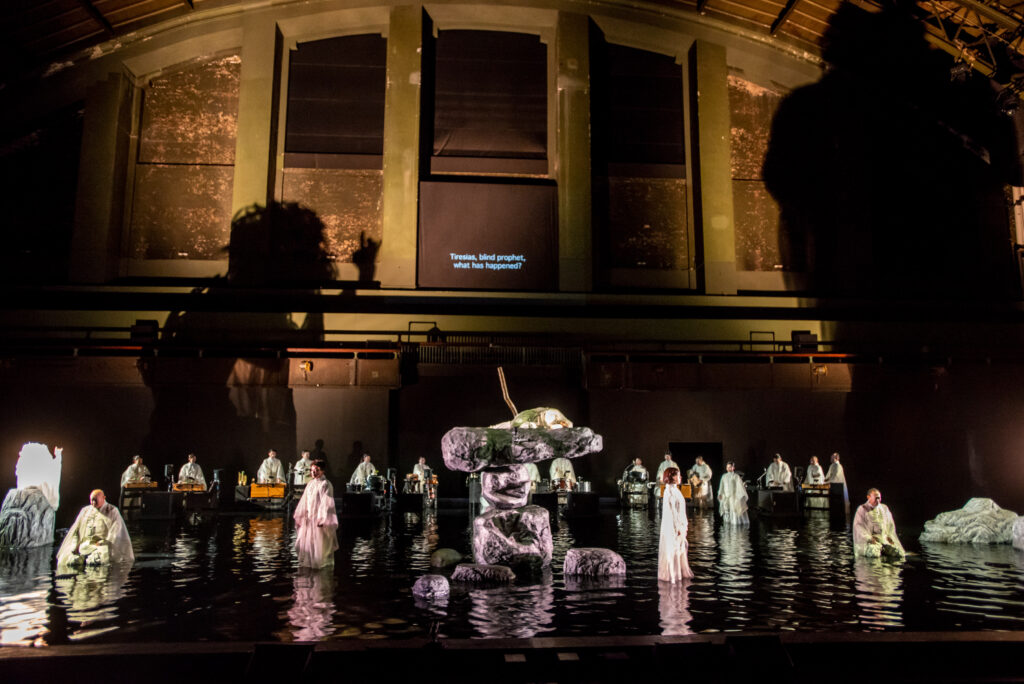
The performance of “Antigone” during “Japan 2019.” During the run, there was also an educational performance to which students at New York City public schools were invited. They were so rivetted by the performance that they gave a standing ovation. Photo: Stephanie Berger
International co-productions provide an opportunity to explore the possibilities of international exchange through the performing arts. In 2021, SPAC led by Mr. Miyagi staged Chekhov’s “The Cherry Orchard” with a French director, Mr. Daniel Jeanneteau, at the Shizuoka Arts Theatre as part of “International Creations in Performing Arts” introduced by JF. This program was initiated to maintain opportunities for discussion and contact between artists, which had been limited due to the COVID-19 pandemic. At the same time, it expanded new potential for performing arts and one of the characteristics of the project is that it introduced an observer system to visualize the creative process. The system documented the site of the co-production from a third-party perspective, and the final report is available on the JF website.
“The Cherry Orchard” is a co-production with T2G – Théâtre de Gennevilliers Centre Dramatique National, with which SPAC has established deep ties, and was able to be performed under the various restrictions imposed by the pandemic. The fact that JF and SPAC invited Mr. Jeanneteau and other French staff members to Japan, despite their two-week quarantine upon arrival, is an expression of JF’s and SPAC’s belief that the circle of cultural exchange should not be closed. Mr. Jeanneteau expressed the same sentiments before the opening performance, saying, “I feel that this international co-production, made possible with the support of the Japan Foundation and SPAC, is a triumph and gives us hope. I believe that we must never, under any circumstances, give up on creation and on exchanges across national and ethnic boundaries.”
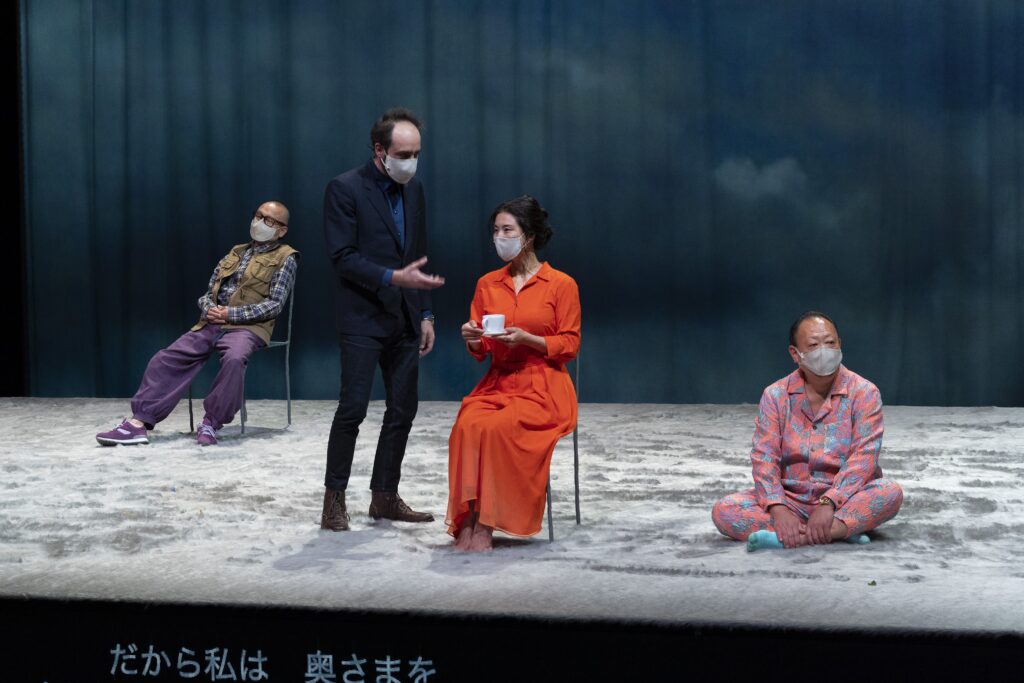
SPAC AUTUMN – SPRING 2021 – 2022 #2 “The Cherry Orchard” selected for the International Creations in Performing Arts Program and performed at the Shizuoka Arts Theatre (2021). © Miura Koichi
In each of the performances, “Shunkan,” “Antigone” and “The Cherry Orchard,” a deep relationship of trust was established among the performers and the producers, and this has resulted in performances that will be talked about for years to come. In addition, although they are all classical productions, they all share the same universality of storytelling that transcends country and time. It strongly appeals to our modern-day hearts and minds. The miracle of a once-in-a-lifetime encounter, in which the audience and performers share time and space, is the quintessence of performing arts. JF will continue to promote performing arts performances as a nexus that connects the amazing talents of artists who create excitement.
【Related pages】
Souls in Resonance, The Legacy of “Japonismes 2018”
American Scholar Revealed the Profound World of The Tale of Genji
Bringing Together Hearts Around the World Through “A Wild Haruki Chase”
